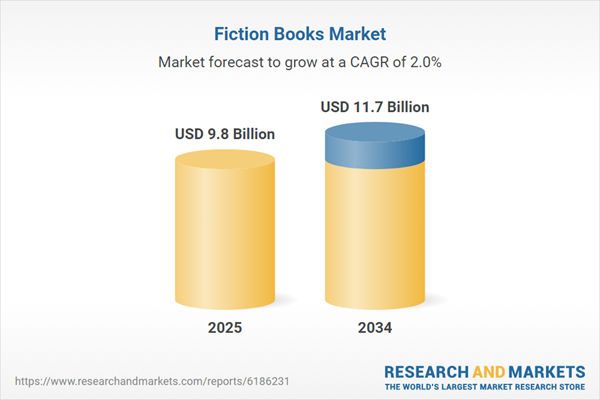The fiction books market continues to thrive as readers seek immersive storytelling, escapism, and thought-provoking narratives across various genres. With digital platforms expanding access to books, the market has evolved beyond traditional print sales to include e-books, audiobooks, and subscription-based reading models. Fiction remains a dominant category in publishing, with bestsellers spanning thrillers, romance, fantasy, and literary fiction. Social media and influencer-driven book recommendations have played a significant role in book discovery, particularly among younger audiences. Independent authors and self-publishing platforms have also gained traction, providing more diverse voices and unconventional storytelling. Meanwhile, major publishing houses continue to invest in high-profile releases, film adaptations, and multimedia storytelling, reinforcing fiction’s cultural and economic significance. As reader preferences shift and digital consumption rises, the fiction books market is poised for continued transformation and expansion.
The fiction books market is witnessing a surge in AI-assisted content creation, with publishers experimenting with machine-generated storytelling for personalized narratives. Audiobooks continue to dominate, fueled by the popularity of podcast culture and multitasking-friendly entertainment. Subscription-based models, such as Kindle Unlimited and Scribd, are reshaping consumer reading habits, providing access to vast libraries at a fixed cost. Print book sales remain resilient despite digital growth, supported by collector editions, signed copies, and the aesthetic appeal of physical books. BookTok and social media trends continue to dictate bestseller lists, with viral recommendations significantly influencing purchasing behavior. Additionally, major streaming services are investing heavily in book-to-screen adaptations, driving demand for fiction books that have cinematic potential. Independent authors are also leveraging direct-to-consumer sales channels, bypassing traditional publishing models to reach niche audiences more effectively.
The fiction books market is expected to see deeper integration of AI-driven storytelling tools, enabling highly customized reading experiences where narratives can evolve based on reader preferences. Interactive fiction and gamified reading experiences will gain popularity, blurring the lines between books and digital entertainment. Sustainability initiatives will shape publishing practices, with increased adoption of eco-friendly printing and digital-first releases. The rise of multilingual fiction and cross-cultural storytelling will cater to a globalized readership, expanding opportunities for authors from diverse backgrounds. Meanwhile, as the demand for immersive experiences grows, augmented reality (AR) and virtual reality (VR) elements may be incorporated into fiction books, offering interactive layers to traditional narratives. While traditional publishing houses adapt to changing consumer behaviors, independent publishing and self-publishing platforms will continue to expand, giving writers more control over their creative output and monetization strategies.
Key Insights: Fiction Books Market
- AI-Assisted Storytelling: Artificial intelligence is being used to generate story concepts, assist in writing, and create dynamic, adaptive fiction, leading to personalized reading experiences.
- Growth of Audiobooks and Podcasts: The increasing demand for audiobooks, supported by voice AI and celebrity narrations, is transforming how readers engage with fiction.
- Social Media-Driven Book Discoverability: Platforms like TikTok, Instagram, and Goodreads are significantly influencing reading trends, making viral recommendations a key driver of book sales.
- Expansion of Direct-to-Consumer Publishing: Independent authors are leveraging self-publishing platforms, crowdfunding, and online stores to connect directly with readers, bypassing traditional publishing gatekeepers.
- Rise of Interactive and Multimedia Fiction: Hybrid storytelling formats, including interactive novels, visual novels, and gamified reading experiences, are gaining traction among digital-native audiences.
- Increasing Popularity of Digital and Subscription Reading: The convenience of unlimited reading models, coupled with e-books and audiobooks, is driving market growth.
- Growing Demand for Diverse and Inclusive Narratives: Readers are seeking representation across cultures, identities, and perspectives, encouraging publishers to invest in more varied voices.
- Book-to-Screen Adaptations Fueling Sales: The rise of streaming services adapting popular fiction books into movies and TV series is significantly boosting readership.
- Advancements in Publishing Technology: AI-driven editing, predictive analytics for bestsellers, and digital-first publishing strategies are enhancing efficiency and content reach.
- Market Saturation and Discoverability Issues: With an overwhelming number of new releases, authors and publishers face challenges in standing out, requiring innovative marketing and reader engagement strategies.
Fiction Books Market Segmentation
By Type of Fiction
- Short Story
- Novella
- Novel
By Type of Book
- Physical Book
- E- Book
- Audio Book
By Genre
- Action and Adventure
- Young Adult
- Crime/Mystery
- Drama
- Horror/Paranormal/Ghost
- Science Fiction
- Other Genres
By End-User
- Children
- Young Adults
- Adults
Key Companies Analysed
- Penguin Random House LLC
- Hachette Livre
- HarperCollins Publishers LLC
- Macmillan Publishers
- Simon & Schuster Inc.
- Turner Publishing Company
- Chronicle Books LLC
- Coffee House Press Inc.
- Scholastic Corporation
- Bloomsbury Publishing plc
- Egmont Group
- Candlewick Press Inc.
- Nosy Crow Ltd.
- Chicken House Ltd.
- Usborne Publishing Ltd.
- Walker Books Ltd.
- Abrams Books Inc.
- Sourcebooks Inc.
- Harlequin Enterprises Limited
- Kensington Publishing Corp.
- Entangled Publishing LLC
- Bold Strokes Books Inc.
- Bella Books Inc.
- Dreamspinner Press LLC
- Carina Press
- Riptide Publishing
- Less Than Three Press LLC
- Little Brown and Company
- Tor Books
- Orbit
- Ace Books
- DAW Books
- Baen Books
- Angry Robot
- Night Shade Books
- Pyr
- Subterranean Press LLC
Fiction Books Market Analytics
The report employs rigorous tools, including Porter’s Five Forces, value chain mapping, and scenario-based modeling, to assess supply-demand dynamics. Cross-sector influences from parent, derived, and substitute markets are evaluated to identify risks and opportunities. Trade and pricing analytics provide an up-to-date view of international flows, including leading exporters, importers, and regional price trends.Macroeconomic indicators, policy frameworks such as carbon pricing and energy security strategies, and evolving consumer behavior are considered in forecasting scenarios. Recent deal flows, partnerships, and technology innovations are incorporated to assess their impact on future market performance.
Fiction Books Market Competitive Intelligence
The competitive landscape is mapped through proprietary frameworks, profiling leading companies with details on business models, product portfolios, financial performance, and strategic initiatives. Key developments such as mergers & acquisitions, technology collaborations, investment inflows, and regional expansions are analyzed for their competitive impact. The report also identifies emerging players and innovative startups contributing to market disruption.Regional insights highlight the most promising investment destinations, regulatory landscapes, and evolving partnerships across energy and industrial corridors.
Countries Covered
- North America - Fiction Books market data and outlook to 2034
- United States
- Canada
- Mexico
- Europe - Fiction Books market data and outlook to 2034
- Germany
- United Kingdom
- France
- Italy
- Spain
- BeNeLux
- Russia
- Sweden
- Asia-Pacific - Fiction Books market data and outlook to 2034
- China
- Japan
- India
- South Korea
- Australia
- Indonesia
- Malaysia
- Vietnam
- Middle East and Africa - Fiction Books market data and outlook to 2034
- Saudi Arabia
- South Africa
- Iran
- UAE
- Egypt
- South and Central America - Fiction Books market data and outlook to 2034
- Brazil
- Argentina
- Chile
- Peru
Research Methodology
This study combines primary inputs from industry experts across the Fiction Books value chain with secondary data from associations, government publications, trade databases, and company disclosures. Proprietary modeling techniques, including data triangulation, statistical correlation, and scenario planning, are applied to deliver reliable market sizing and forecasting.Key Questions Addressed
- What is the current and forecast market size of the Fiction Books industry at global, regional, and country levels?
- Which types, applications, and technologies present the highest growth potential?
- How are supply chains adapting to geopolitical and economic shocks?
- What role do policy frameworks, trade flows, and sustainability targets play in shaping demand?
- Who are the leading players, and how are their strategies evolving in the face of global uncertainty?
- Which regional “hotspots” and customer segments will outpace the market, and what go-to-market and partnership models best support entry and expansion?
- Where are the most investable opportunities - across technology roadmaps, sustainability-linked innovation, and M&A - and what is the best segment to invest over the next 3-5 years?
Your Key Takeaways from the Fiction Books Market Report
- Global Fiction Books market size and growth projections (CAGR), 2024-2034
- Impact of Russia-Ukraine, Israel-Palestine, and Hamas conflicts on Fiction Books trade, costs, and supply chains
- Fiction Books market size, share, and outlook across 5 regions and 27 countries, 2023-2034
- Fiction Books market size, CAGR, and market share of key products, applications, and end-user verticals, 2023-2034
- Short- and long-term Fiction Books market trends, drivers, restraints, and opportunities
- Porter’s Five Forces analysis, technological developments, and Fiction Books supply chain analysis
- Fiction Books trade analysis, Fiction Books market price analysis, and Fiction Books supply/demand dynamics
- Profiles of 5 leading companies - overview, key strategies, financials, and products
- Latest Fiction Books market news and developments
Additional Support
With the purchase of this report, you will receive:- An updated PDF report and an MS Excel data workbook containing all market tables and figures for easy analysis.
- 7-day post-sale analyst support for clarifications and in-scope supplementary data, ensuring the deliverable aligns precisely with your requirements.
- Complimentary report update to incorporate the latest available data and the impact of recent market developments.
This product will be delivered within 1-3 business days.
Table of Contents
Companies Mentioned
- Penguin Random House LLC
- Hachette Livre
- HarperCollins Publishers LLC
- Macmillan Publishers
- Simon & Schuster Inc.
- Turner Publishing Company
- Chronicle Books LLC
- Coffee House Press Inc.
- Scholastic Corporation
- Bloomsbury Publishing PLC
- Egmont Group
- Candlewick Press Inc.
- Nosy Crow Ltd.
- Chicken House Ltd.
- Usborne Publishing Ltd.
- Walker Books Ltd.
- Abrams Books Inc.
- Sourcebooks Inc.
- Harlequin Enterprises Limited
- Kensington Publishing Corp.
- Entangled Publishing LLC
- Bold Strokes Books Inc.
- Bella Books Inc.
- Dreamspinner Press LLC
- Carina Press
- Riptide Publishing
- Less Than Three Press LLC
- Little Brown and Company
- Tor Books
- Orbit
- Ace Books
- DAW Books
- Baen Books
- Angry Robot
- Night Shade Books
- Pyr
- Subterranean Press LLC
Table Information
| Report Attribute | Details |
|---|---|
| No. of Pages | 160 |
| Published | October 2025 |
| Forecast Period | 2025 - 2034 |
| Estimated Market Value ( USD | $ 9.8 Billion |
| Forecasted Market Value ( USD | $ 11.7 Billion |
| Compound Annual Growth Rate | 1.9% |
| Regions Covered | Global |
| No. of Companies Mentioned | 37 |









